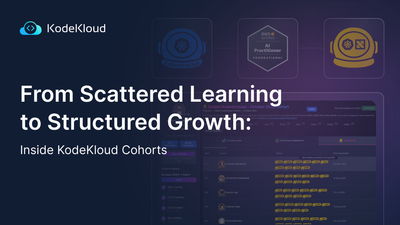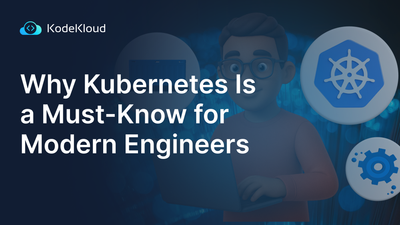DevOps success hinges on being adaptable and scalable. If an application experiences a surge in traffic, an adaptable infrastructure should be able to allocate more resources to handle the extra traffic.
In this guide, we'll dive into cloud computing’s impact on DevOps, what makes it powerful, and its benefits and challenges.
How Does Cloud Computing Make DevOps Flexible?
Cloud computing supports most DevOps objectives because it’s built on the idea of flexibility. Through cloud services, DevOps teams can quickly deploy, manage, and scale applications efficiently.
This is the reason organizations adopt cloud solutions each year, with a growing shift towards multi-cloud and hybrid cloud solutions. Here are some cloud adoption statistics from the 2024 State of DevOps Report:
- Multi-cloud - 19.6%
- Public cloud - 51.5%
- Hybrid cloud - 33.6%
- On-premises - 19.8%
- Under the desk - 3.2%
- Other - 2.5%
Multi-cloud involves using multiple cloud services from different providers, like Microsoft Azure and AWS.
Hybrid clouds combine private cloud or on-premises infrastructure with public cloud services. For example, you might use a public cloud to test new applications because it's cost-effective and scalable. At the same time, you might keep your sensitive data on a private cloud or on-premises for enhanced security or to comply with regulations.
This hybrid approach gives organizations the best of both worlds: the security and control of private solutions with the scalability and innovation of public clouds.
What Makes Cloud Computing so Powerful For DevOps?
Five key features make cloud computing a must-have for DevOps:
- On-demand self-service: With cloud computing, you can automatically provision compute resources whenever you need them without waiting for human intervention — almost like a vending machine for IT resources. This is useful for DevOps teams that need to quickly scale up or down based on project demands.
- Broad network access: Cloud services are available over the network and accessible through mobile phones, tablets, laptops, and workstations. This means your team and suppliers can work from anywhere at any time as long as there's internet access. This breaks down geographical barriers and supports remote collaboration.
- Resource pooling: Your cloud provider pools computing resources to serve multiple consumers using a multi-tenant model. Imagine an apartment building where utilities and amenities are shared among all tenants according to their needs. Resource pooling in the cloud works the same way, offering efficiency and scalability. Storage, processing, memory, and network bandwidth are dynamically assigned according to demand.
- Rapid elasticity: Resources can be elastically provisioned and released to scale rapidly outward or inward with demand. Imagine having an expandable container that grows or shrinks to fit whatever you put in it. This elasticity makes it seem like you have virtually unlimited resources, allowing for flexible adjustment to workload changes.
- Measured service: Cloud systems automatically control and optimize resource usage by metering storage, processing, bandwidth, and active user accounts. This means you only pay for what you use, much like how utility bills work. This pay-as-you-go model helps keep operating costs transparent and manageable.
By aligning your DevOps practices with these five essential cloud characteristics, you can ensure your team maximizes the benefits of cloud computing, from increased flexibility and scalability to cost efficiency and security.
What key outcomes does cloud computing improve?
Adopting cloud computing in DevOps leads to significant improvements in three key outcomes:
- Operational: Cloud computing enables you to deploy and operate applications more efficiently, reducing the time and effort required to manage infrastructure.
- Financial: The pay-as-you-go model of cloud services helps you save on infrastructure costs by only paying for what you use.
- Collaborative: Cloud platforms facilitate better collaboration among development, operations, and other teams by providing common tools and environments for building, testing, and deploying applications.
Cloud computing doesn't just improve technical outcomes; it also positively affects the people using it. When your team uses cloud computing in DevOps, expect improvements in job satisfaction, productivity, and growth opportunities.
This is because working with the latest cloud technologies can be rewarding. Engineers get to solve new challenges and use innovative tools that make their jobs easier and more interesting.
Cloud computing also automates many tedious tasks, from setting up servers to scaling resources. This means your team spends less time on routine work and more on what matters.
Lastly, the cloud is always evolving, offering new services and features. Learning these cloud skills can help your engineers advance their careers.
Of course, it’s not all sunshine and rainbows. Let’s explore some challenges you might face when venturing into cloud computing — and how to overcome them effectively.
Cloud Computing Challenges
Even though cloud computing offers many benefits, using it well can be tricky — hence the need for a solid cloud strategy.
Here are some pitfalls you might encounter:
- Cost management: While the cloud can save you money, it's easy to lose track of spending if you're not careful. If you don't monitor and manage your cloud resources, costs (cloud spend) can spiral.
- Cloud security: Thinking the cloud provider will handle all your security is a mistake. It's like assuming a home security system will protect your house even if you leave your doors unlocked. You must understand your role in securing your cloud environment, depending on what service model you’re using: SaaS, PaaS, or IaaS.
- Cloud migration complexity: Moving to the cloud isn't just a matter of copying data and applications from one place to another (“lift and shift”). Like relocating from a studio flat to a country estate, you must plan what goes where and what might need to change.
To avoid these pitfalls, align your goals with the capabilities of your cloud service provider.
Strategies for Effective Cloud Usage
Leveraging cloud computing in DevOps requires a thoughtful approach. Here’s what works:
- Outline your goals: Define your objectives with cloud computing. Are you looking to improve deployment speed, enhance scalability, or reduce costs? Setting clear goals helps direct your cloud efforts effectively.
- Automate as much as possible: Use cloud services and tools like Azure DevOps to automate the deployment, scaling, and management of applications. This can reduce manual tasks and errors greatly, similar to how CI/CD pipelines automate software release processes.
- Optimize applications for the cloud: Design or refactor your applications to fully exploit the benefits of cloud computing. This might involve adopting microservices architecture to ensure your applications are scalable and resilient.
- Manage cloud costs: Use cloud cost management tools to monitor and control your spending. This helps avoid unexpected expenses and ensures your cloud usage aligns with your budget.
- Ensure security and compliance: Familiarize yourself with your cloud provider's security offerings and configure your cloud environment according to your governance policies and best practices. Review access controls, encryption, and compliance standards to protect your data and applications.
While platforms and processes are important, people remain at the core of any DevOps cloud strategy. And wherever people are involved, the need for training arises.
Why Training Matters for DevOps Cloud Transformation
Your team needs the necessary skills and knowledge to overcome the challenges of cloud computing and maximize its benefits. This could involve online courses, workshops, or certification programs focused on cloud architecture, security, and management tools.
At Kodekloud, we have top-rated Cloud Courses that will:
- Keep your team updated on the latest cloud technologies and methodologies.
- Help prepare your engineers for industry-recognized certifications, boosting your team's credibility and cloud expertise.
Encouraging a culture of continuous learning and skills development enhances your team's ability to innovate while increasing job satisfaction and retention.
More on DevOps:















Discussion